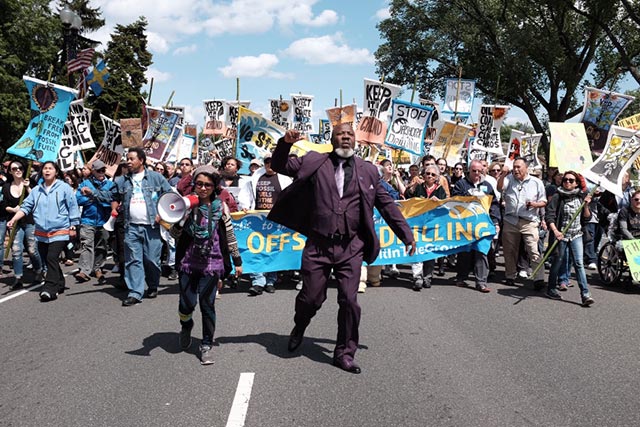
Part of the Series
Planet or Profit
Did you know that Truthout is a nonprofit and independently funded by readers like you? If you value what we do, please support our work with a donation.
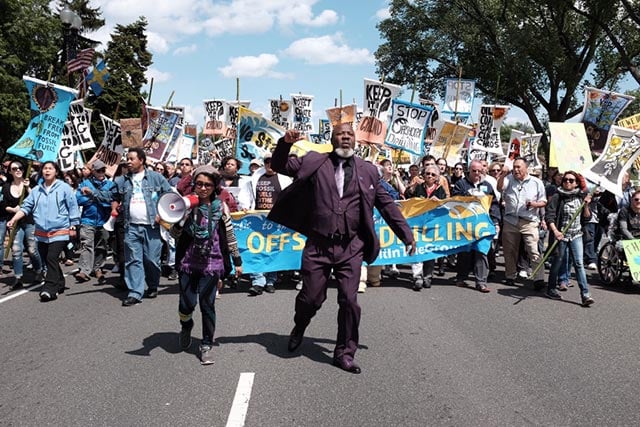 Gulf Coast environmental justice advocates Yudith Azareth Nieto and Hilton Kelly lead a march in Washington, DC, against offshore oil drilling on May 15, 2016. About 1,300 people attended the protest, which was part of a global week of action against fossil fuel extraction. (Photo: Sabelo Narasimhan)
Gulf Coast environmental justice advocates Yudith Azareth Nieto and Hilton Kelly lead a march in Washington, DC, against offshore oil drilling on May 15, 2016. About 1,300 people attended the protest, which was part of a global week of action against fossil fuel extraction. (Photo: Sabelo Narasimhan)
As Shell Oil and the US Coast Guard continued to clean up a large oil spill in the Gulf of Mexico on Sunday, about 1,300 protesters from across North America marched in Washington, DC, to protest the Obama administration’s offshore drilling plan.
Lindsay Meiman, an organizer with the climate justice group 350.org, said the spill “reinvigorated the sense of urgency to ban offshore drilling” already felt by the frontline communities in the Gulf and Arctic regions that sent activists to lead the protest.
To see more stories like this, visit “Planet or Profit?”
“I think it just proves time and time again that there is no such thing as safe fossil fuel extraction and safe offshore drilling,” Meiman told Truthout.
“It pales in comparison to the BP disaster, but it still is pretty gnarly looking; I wouldn’t call it a small spill at all.”
First spotted on Thursday evening, the 88,000-gallon spill reportedly caused a long oil sheen over 26 square miles of the Gulf’s surface, about 90 miles off the coast of Louisiana, after an undersea pipeline connecting a well to a drilling platform released oil into the water.
Jonathan Henderson, who has monitored oil spills in the Gulf since the massive BP spill in 2010 and founded the watchdog photography organization Vanishing Earth, flew over the spill in a small aircraft on Saturday and shared his observations with Truthout.
“It pales in comparison to the BP disaster, but it still is pretty gnarly looking; I wouldn’t call it a small spill at all,” Henderson said. “[I saw a] rainbow sheen, deep bruising on the surface of the Gulf. It looks like the Gulf got punched in the face, you know?”
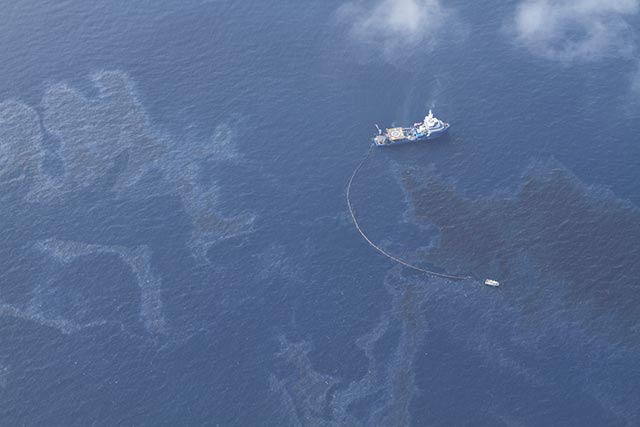 Boats skim oil and water off the surface of the Gulf of Mexico on May 14, 2016. An undersea oil pipeline connecting a well to an offshore platform operated by Shell Oil discharged 88,000 gallons of oil into the Gulf last week. (Photo: Jonathan Henderson / Vanishing Earth)
Boats skim oil and water off the surface of the Gulf of Mexico on May 14, 2016. An undersea oil pipeline connecting a well to an offshore platform operated by Shell Oil discharged 88,000 gallons of oil into the Gulf last week. (Photo: Jonathan Henderson / Vanishing Earth)
During the demonstration in Washington, DC, protesters marched from the White House to the Lincoln Memorial, with activists from the Gulf and Arctic regions leading the way. The protest wrapped up a “global wave of action” against fossil fuel extraction that included demonstrations and direct actions in the United States and a dozen other countries over the past two weeks.
The Gulf and Arctic should not be considered “sacrifice zones” for fossil fuel production.
The Obama administration is working to finalize its five-year offshore drilling plan, which includes several lease sales in the Gulf and Arctic seas and has drawn criticism from environmentalists across the country. The administration scrapped a proposal to open the Atlantic Ocean to offshore drilling after intense public outcry erupted on the politically powerful East Coast, but plans to continue leasing in the already battered Gulf and sensitive Arctic have enraged local activists.
“The offshore drilling plan has already barred drilling off the Atlantic coast, so this action was really to stress that what is dangerous in [the] Atlantic is dangerous anywhere,” said Meiman, who added that the Gulf and Arctic should not be considered “sacrifice zones” for fossil fuel production.
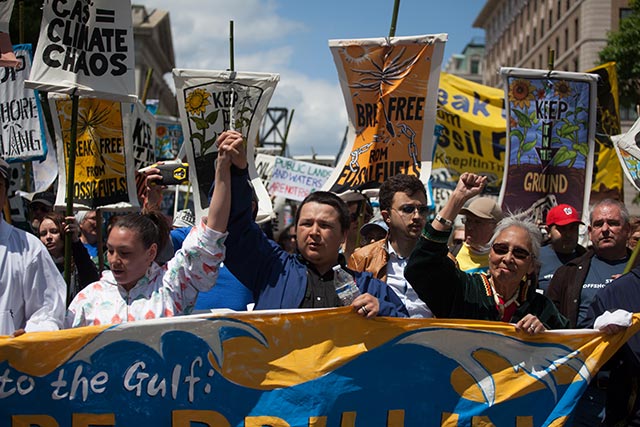 Activists march in Washington, DC, against offshore drilling on May 15, 2016. The demonstration, which was held just days after a large oil spill in the Gulf of Mexico, was lead by activists from the Gulf Coast and Native communities in the Alaskan Arctic, where the impacts of offshore drilling are felt the most. (Photo: Eman Mohammed)
Activists march in Washington, DC, against offshore drilling on May 15, 2016. The demonstration, which was held just days after a large oil spill in the Gulf of Mexico, was lead by activists from the Gulf Coast and Native communities in the Alaskan Arctic, where the impacts of offshore drilling are felt the most. (Photo: Eman Mohammed)
In March, protesters interrupted a lease auction in New Orleans, where federal regulators offered large sections of the Gulf to private oil and gas companies. Offshore drilling has also come up on the presidential campaign trail, with Democratic hopeful Bernie Sanders proposing to end the oil and gas leasing programs on public lands and in federal waters. His rival, Hillary Clinton, has proposed vague reforms to the leasing programs, while Republicans generally support them.
Oil spills are actually quite common in the Gulf region, where offshore drilling platforms dot the horizon and dozens of oil refineries churn out gasoline and petrochemical products, but most are not big enough to make national headlines, as last week’s Shell spill did.
That spill occurred far away from shore, and Shell Oil and the Coast Guard do not expect any oil from that spill to reach the coastline. Federal regulators have already allowed Shell to resume production at the offshore platform connected to the piping that leaked the oil as they investigate the cause of the leak.
Henderson said he was disappointed, but not surprised, to see only three vessels skimming oil off the surface of the Gulf when he flew over the spill on Saturday morning.
If we learned anything from the BP disaster, it’s that the industry is “woefully unprepared” for large accidents, Henderson told Truthout. “To see such a paltry response shows the industry hasn’t invested enough in its ability to respond, or its will to respond,” he said, adding that Shell is one of the wealthiest companies in the world. “There’s no reason why there shouldn’t be 50 skimmers out there, not just three of them.”
By Sunday, joint efforts by Shell Oil and the Coast Guard had recovered about 51,000 gallons of oily water from the surface of the Gulf, according to a statement released by the company.
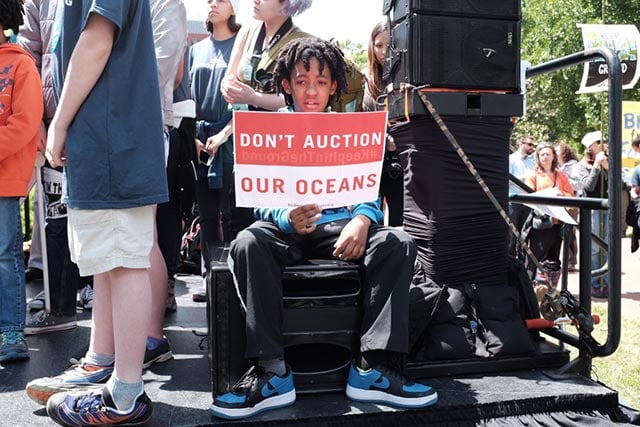 A young demonstrator holds a sign during a protest against offshore drilling in Washington, DC. The Obama administration is finalizing a five-year plan to auction off large portions of the Gulf of Mexico and Arctic seas to private oil and gas companies. (Photo: Sabelo Narasimhan)
A young demonstrator holds a sign during a protest against offshore drilling in Washington, DC. The Obama administration is finalizing a five-year plan to auction off large portions of the Gulf of Mexico and Arctic seas to private oil and gas companies. (Photo: Sabelo Narasimhan)
Media that fights fascism
Truthout is funded almost entirely by readers — that’s why we can speak truth to power and cut against the mainstream narrative. But independent journalists at Truthout face mounting political repression under Trump.
We rely on your support to survive McCarthyist censorship. Please make a tax-deductible one-time or monthly donation.